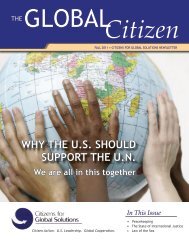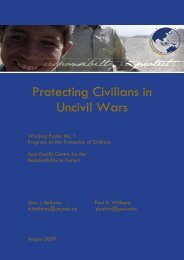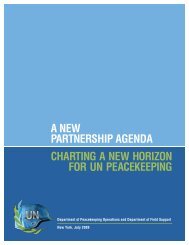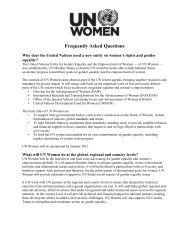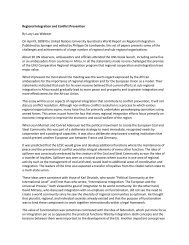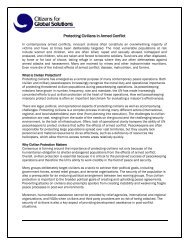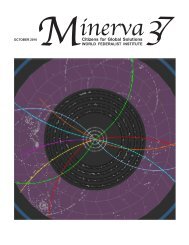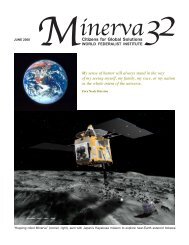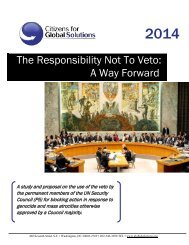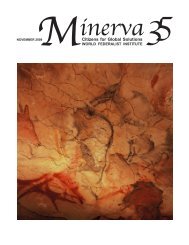Minerva, Fall 2011 - Citizens for Global Solutions
Minerva, Fall 2011 - Citizens for Global Solutions
Minerva, Fall 2011 - Citizens for Global Solutions
- No tags were found...
Create successful ePaper yourself
Turn your PDF publications into a flip-book with our unique Google optimized e-Paper software.
nation that affect many women as well asindividuals from other vulnerable groupsin the name of religion or belief or due tocultural and traditional practices” (PP 10and OP 11(b)).• HRC Resolution 10/23, on the IndependentExpert in the field of culturalrights, affirms that “no one may invokecultural diversity to infringe upon humanrights guaranteed by international law,nor to limit their scope”.• The UN Declaration on the Rights ofIndigenous Peoples affirms the spiritualtraditions of Indigenous Peoples, whilealso underscoring that the “human rightsand fundamental freedoms of all shall berespected” (art 46).• The Beijing Declaration and Plat<strong>for</strong>m<strong>for</strong> Action (A/CONF.177/20) requiresgovernments to “refrain from invokingany custom, tradition or religious considerationto avoid their obligations”.• The African Women’s Protocol requiresStates to “eradicate elements in traditionaland cultural beliefs, practices andstereotypes which legitimise and exacerbatethe … tolerance of violence againstwomen”.• HRC Resolution 16/3 – mandate ofthe study, “Promoting human rights andfundamental freedoms through a betterunderstanding of traditional values of humankind”,stresses that “traditions shallnot be invoked to justify harmful practicesviolating universal human rights normsand standards”. It tasks the AdvisoryCommittee to “prepare a study on how abetter understanding and appreciation oftraditional values of dignity, freedom andresponsibility can contribute to the promotionand protection of human rights”.In light of the previous discussion and examples,it cannot be assumed that these“traditional values” will contribute to thepromotion and protection of human rights.This is why the Advisory Committee hasbeen requested to prepare a study whichwill fully explore the impact of these “traditionalvalues” on human rights. Thismeans understanding and appreciatingboth the positive and negative impacts.Dignity as a traditional valueThe concept of “dignity”, particularlyafter a reference to “traditional values”,can be misused to justify human rightsviolations, through concepts such as the“dignity of women”. Such problematicuses suggest a particular “dignified” role<strong>for</strong> individuals within society based onthe extent to which they play a traditionalrole. Dignity is in fact inherent to the humanperson and, thus, it is important thatthe Advisory Committee’s report focuson the language from the preamble of theUDHR that affirms “the inherent dignityand worth of the human person”.Responsibility as a traditional valueIt is unclear what is intended by “responsibility”as a traditional value of humankind.It is also unclear under what basisin international human rights law wouldjustify elevating “responsibility” to aprinciple on an equal footing with “theinherent dignity and worth of the humanperson” and “freedom”. The dangers ofsuch a lack of clarity around the conceptof “responsibility” as a traditional valuecan be illustrated by cases where it hasbeen invoked to justify abuses of an individual’shuman rights. For example, awoman’s “responsibility” to maintain the“honour” of the family:“In patriarchal and patrilineal societiesmaintaining the honour of the family is awoman’s responsibility. In these societies,the concept of women as commoditiesand not as human beings endowed withdignity and rights equal to those of menis deeply embedded. Women are seen asthe property of men and they have to beobedient and passive, not assertive andactive” (Special Rapporteur on Violenceagainst Women on “honour” crimes,2002). 3The principle of universality reaffirmsthat all human beings are entitled to thefull enjoyment of all human rights. Thiscan never be conditional on ill-definednotions of “responsibility”. Under internationallaw, the State clearly has theresponsibility to promote and protect universalhuman rights consistently with theuniversal values of equality and non-discrimination,amongst others. Any report to35 • <strong>Minerva</strong> #39 • November <strong>2011</strong>the Human Rights Council should clearlystate the potential negative implications ofan understanding of responsibility whichrelates to traditions, whilst underlining anappreciation <strong>for</strong> the responsibility of theState in protecting the fundamental rightsand freedoms of the individual.The role of family, community, societyand educational institutionsFinally, the resolution notes “the importantrole of family, community, societyand educational institutions in upholdingand transmitting these values”. It is problematicto promote the “role of family,community, society and educational institutions”without acknowledging that humanrights violations may also come fromwithin these institutions, e.g. in the caseof spousal abuse or marital rape. The SpecialRapporteur on violence against womendedicated an entire report on culturalpractices within the family that are violenttowards women (E/CN.4/2002/83),including female genital mutilation, honourkillings, the pledging of girls <strong>for</strong> economicand cultural appeasement, witchhunting, incest, <strong>for</strong>ced/child marriage,rape, widow rites, female infanticide, andcaste-based discrimination and violence.Furthermore, the study should acknowledgethat, through the ICPD Programmeof Action (para 5.2a), the internationalcommunity has recognized that “family”takes a plurality of <strong>for</strong>ms, including single-parentfamilies, households with extendedfamilies, families with parents ofthe same sex or gender, etc. This recognitionchallenges traditional <strong>for</strong>ms of relationshipssuch as marriage between a manand a woman as the only kind with “value”and welcomes the value and worth ofalternative <strong>for</strong>ms of relationships as well.Universality of human rights, equality,and non-discriminationThe common “values of humankind”underpinning international human rightslaw are already inscribed in the UniversalDeclaration of Human Rights and otherinternational human rights instruments.These include equality and non-discrimination– specifically to protect groupsthat have “traditionally” faced marginali-



